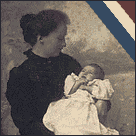%%rimage[French baby's human rights cause confrontation with Pope]=X40036_727_CWFrenchBabyLogo_t55.jpg French baby's human rights cause confrontation with Pope
The new baby caused a classic collision between a secular state and a theocracy: No, Your Holiness, she is not a baptised Jewish baby who belongs to the Church. She is a tiny citizen of France and has the rights of any other Frenchman....
 The baby came early. A French couple, the Montels, had barely stepped ashore near Rome in the summer of 1840 when they realised they must quickly go to a hotel and summon a midwife. Their little girl arrived safely and at first all seemed well. However a couple of days later there came a knock at the door. It was the police — the Papal Police — for at that time the pope governed much of Italy. The police demanded that the Montels hand over their baby daughter.
The baby came early. A French couple, the Montels, had barely stepped ashore near Rome in the summer of 1840 when they realised they must quickly go to a hotel and summon a midwife. Their little girl arrived safely and at first all seemed well. However a couple of days later there came a knock at the door. It was the police — the Papal Police — for at that time the pope governed much of Italy. The police demanded that the Montels hand over their baby daughter.
She was to be separated from her parents and raised by the Catholic Church. This was pefectly legal in the pope's domain, for according to Canon Law, (the Church law which also governed the Papal States), it was forbidden for a Catholic child to be brought up outside the faith. This applied because the baby was a member of the Church, which henceforth assumed responsibility for the good of her soul.
But how on earth had the Montels' baby become a Catholic? They were told that a hotel chambermaid claimed to have entered the room where the newborn was lying and, when no one was looking, quietly baptised her. This was a recurring nightmare which for centuries had haunted Jewish families living in the Papal States: all it took was a few drops of water and a whispered formula to have their child taken away from them forever.
The Montels appealed to the French ambassador and he put their case before the Vatican Secretary of State. The ambassador informed the papal official that the French Government considered all citizens to be equal before the law, regardless of their religion. "Monsieur Montel, to be precise, is to us not a Jew, but a French citizen who should be treated in the Papal States as the equal of his fellow citizens". [1]
Naturally, this argument didn't impress the papal minister whose job was to uphold the laws of God, not those of man. The Holy Father, he claimed, was bound by his "conscience" to hold on to the child. ...However, there were certain practical problems which also preyed upon the mind of the Pontiff. His subjects were restless and he knew he might find himself needing French troops in order to put down a rebellion (which, a few years later in 1849, indeed became necessary). The French, he decided, must not be antagonised.
In the end the Pope discovered that his conscience could be salved by getting the French Government to solemnly promise to use "all possible means" to have the baby raised a Catholic. Everyone knew, of course, how far this undertaking went. The French ambassador made no secret of the fact that the "means" open to a secular government did not include "the power to make a Frenchman raise a child in a religion different from his own." [2]
France was a secular country where Church and state were firmly separated. No religious privileges — or religious discrimination — were allowed. Thus the little girl was returned to her family and the French Government considered her religion to be none of its business.

This equality before the law — égalité — is one of the ideals of French secularism. All are to be treated equally, with no regard to distinctions like rank or religion. This ideal is fundamental to France.
A century later, when much of France was governed by a puppet regime of the Nazis, a Vichy official threatened a Frenchman because he knew that Jews were being sheltered in the village. He was reproved by being reminded of this ideal: "We do not know what a Jew is; we only know men." [3]
Related story about this little-known tradition of kidnapping and conversion:
Canon Law in action: Was the Papal State a “perfect society”?
Notes
1. David I. Kertzer, The kidnapping of Edgardo Mortara, (1997), pp. 154.
2. Ibid., p. 155.
3. Rev. André Trocmé, Chambon-sur-Lignon, 10 August 1942, quoted in Patrick Henry, "Why we must teach the rescuers when we teach the Holocaust", First Things, 1999. http://people.whitman.edu/~henrypg/rescuers.htm







